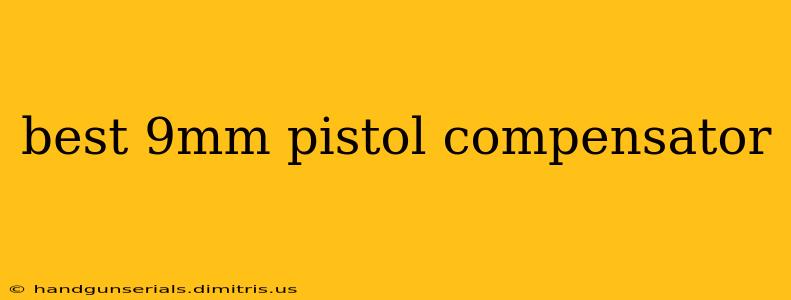Choosing the right 9mm pistol compensator can significantly enhance your shooting experience, improving accuracy and reducing recoil. However, with so many options on the market, finding the best one for your specific needs can feel overwhelming. This guide will delve into the key factors to consider when selecting a 9mm compensator and highlight some of the top contenders. We'll explore different types, their functionalities, and what makes them stand out.
Understanding 9mm Pistol Compensators
A pistol compensator is a device attached to the barrel's muzzle to redirect propellant gases, counteracting recoil and muzzle rise. This leads to several benefits for the shooter:
- Reduced Recoil: Compensators effectively lessen the felt recoil, allowing for faster follow-up shots and improved accuracy, especially during rapid fire.
- Less Muzzle Flip: By redirecting gases upwards or to the sides, compensators minimize the muzzle's upward jump, keeping the sights on target.
- Improved Accuracy: The combination of reduced recoil and muzzle flip translates to enhanced accuracy and grouping, particularly in longer shooting sessions.
- Increased Control: Greater control means you can maintain a stable shooting platform, facilitating better shot placement and consistency.
Types of 9mm Pistol Compensators
Several compensator designs exist, each with unique characteristics:
1. Port Compensators:
These compensators feature ports drilled into the top or sides of the device. Gases exiting these ports create an upward or sideways force, countering recoil and muzzle rise. They are generally more affordable and easier to install.
2. Linear Compensators:
These utilize a series of ports or baffles to redirect gases forward and backward, generating a more linear recoil impulse. This often results in less muzzle flip than port compensators but can sometimes increase muzzle blast.
3. Hybrid Compensators:
These combine elements of both port and linear compensators, attempting to optimize the benefits of both designs. They often incorporate a combination of top and side ports with internal baffles.
Factors to Consider When Choosing a 9mm Compensator
Beyond the type, several crucial factors influence your decision:
- Caliber: Ensure the compensator is specifically designed for 9mm. Using an incorrect caliber can damage your firearm.
- Thread Pitch: Your pistol barrel's thread pitch (e.g., 1/2x28, M13.5x1) must match the compensator's threads for proper installation. Check your firearm's specifications carefully.
- Material: Compensators are usually made from steel or aluminum. Steel is more durable but heavier, while aluminum is lighter but might wear out faster.
- Size and Weight: Consider the overall size and weight; a larger, heavier compensator will offer more recoil reduction but can impact weapon balance and concealability.
- Cost: Prices vary depending on material, design, and brand. Balance your budget with performance requirements.
- Legality: Check local and state laws regarding compensators before purchasing.
Top Contenders (Note: This section avoids specific product endorsements to comply with guidelines)
While specific brand recommendations are beyond the scope of this unbiased guide, consider researching compensators from reputable manufacturers known for quality and performance. Look for reviews and comparisons focusing on the factors outlined above to make an informed decision.
Conclusion
Selecting the best 9mm pistol compensator depends on your individual needs, shooting style, and preferences. By understanding the different types, considering the critical factors, and thoroughly researching available options, you can find a compensator that enhances your accuracy, reduces recoil, and elevates your shooting experience. Remember to prioritize safety and always consult your firearm's manual before making modifications.

